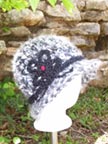The Hidden Disability – Chapter 3
Our son had a different way of handling the frustrations he experienced with handwriting. He didn’t see the point of writing. At all. “I can build anything I want,” he’d say. “Why should I have to write?”
To combat his blocks to writing, we found a professional artist and got our son into drawing lessons. This helped his writing efforts some to improve without the stress of letters and characters. And without it seeming like work.
Our son really fought the idea at first, but his art teacher, Kevin, was a great guy and a patient man with a teenage son at home fighting cancer. Kevin supported his family wholly on his art and was a strong yet gentle influence. Kevin also turned out to be a positive male role model while John deployed that year, as well as an essential part of helping our son overcome his issues with learning to write.
Having been born during the summer, we had the option of holding our son back a year before starting him in school. However, because his father was so big for his age as a kid, as is our son to a degree, we chose not to hold him back. So much bigger than his peers, John remembered well the hardships he faced as a child “giant.” But he was also the oldest in his class, not the youngest like our son. Still he did not want him to go through what he did. And yet, I still struggle with feelings about our choice as I watch our son, nearly the youngest in class (and a little emotionally immature as is common in gifted children), be expected to have the same maturity as his classmates who are generally much older (and mostly girls).
We sent our son to first grade being able to read at an appropriate level. Yet, as the year progressed, his reading seemed to regress. Looking back now, I see that there were likely several factors involved. However, his teacher at the time unfortunately played a hand. He began coming home and telling me he wasn’t smart enough for school. To please not make him go. He didn’t just tell me these things. I began to hear from his art teacher, Kung Fu teacher, other parents and adults in his life, “Do you know your son is saying these things? What is happening at that school?”
It took awhile to figure it all out, but we discovered he was being used as an example of the kind of student you didn’t want to be. Labels and names were used and the children of the class responded and repeated as the example was set for them. I can’t tell you how my heart broke over and over that year. We has to escalate the issue, the school responded, his progress and situation were carefully monitored. Finally he was old enough to be tested.
Early in school, because he daydreamed, some wondered if he was ADD or similar. And he was often treated as if he was, although his grades remained good. Testing showed he wasn’t ADD at all. His hurdles involved a combination of language processing issues in handwriting (dysgraphia) and speeding forward to the future also later revealed a complicated vision deficiency involving mainly one eye. (i.e. one symptom – characters do not stay in the right order – and yet it’s not dyslexia.) Although it’s really more complicated than that and involves 6 different medical diagnoses. Daydreaming was a symptom of his brain basically “blue screening” after using up available working memory. We explored a lot of avenues involving brain training as well. Still he managed to have average-good grades when he produced work after a lot of effort at home, but often appeared to “just not be trying” at school.
This also made it more difficult to find answers for him, because his “disabilities” were very specific, not part of a package of other hurdles as it often seems to turn out for many kids. He’s not dyslexic, he’s not ADD, he’s not a lot of things. Not to mention the emotional impact of really trying hard the way he knew how, and knowing his teachers doubted his efforts and sincerity. As a mother, I knew inside there had to be more to it all, but things we tried for what we did learn seemed to only work so-so. Many times we began to doubt as well. Maybe it was simply that he wasn’t trying. However, we didn’t give up our search or observations, or for that matter, learning about how humans learn.
Read Chapter 4 here…















Recent Comments